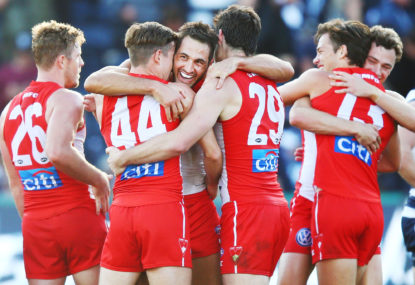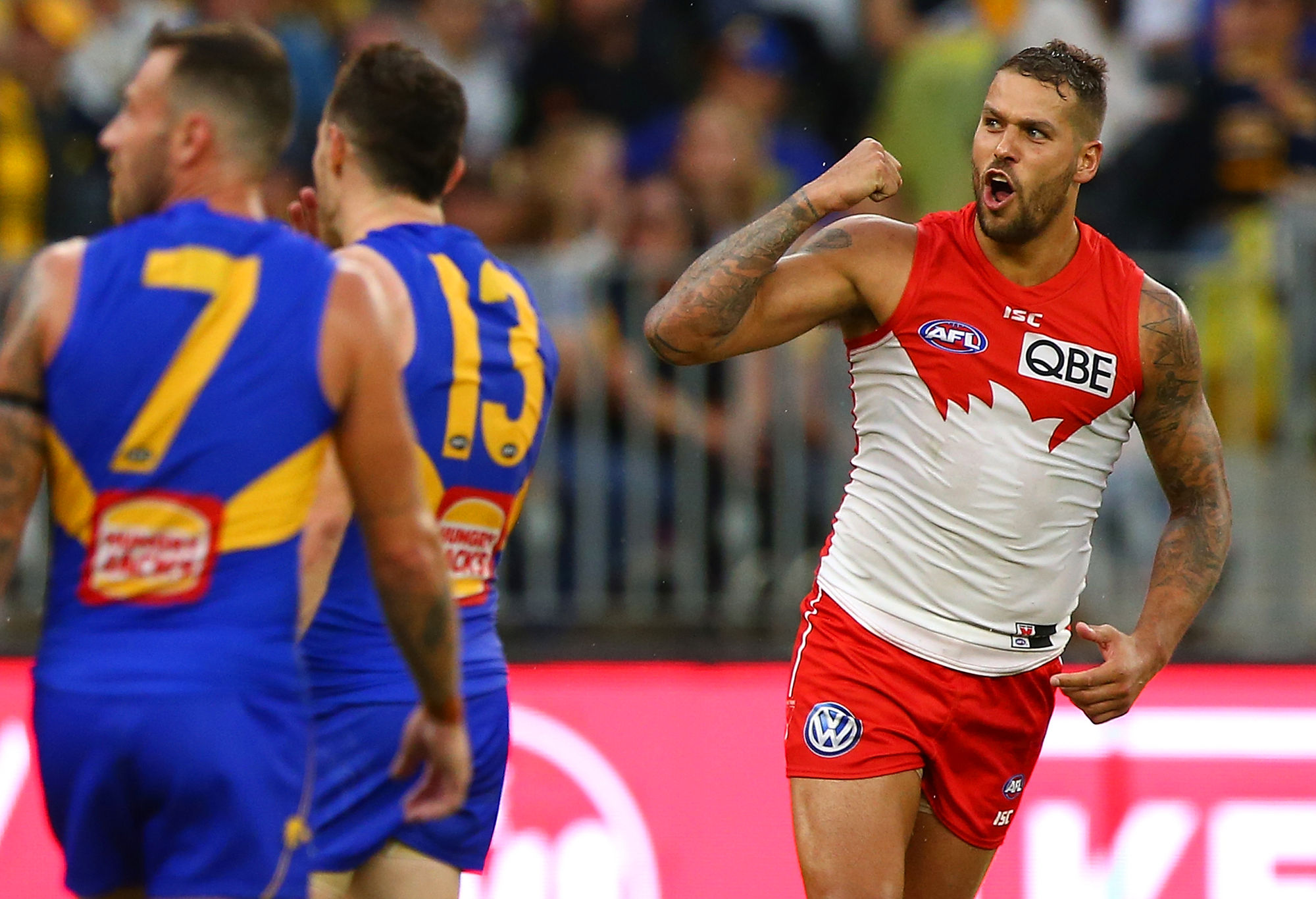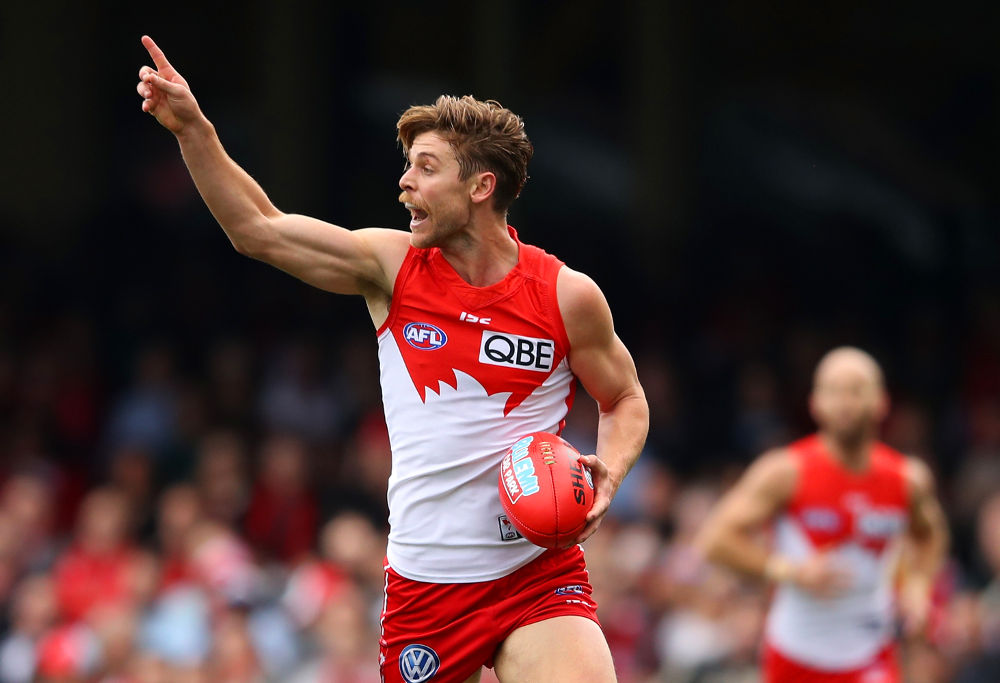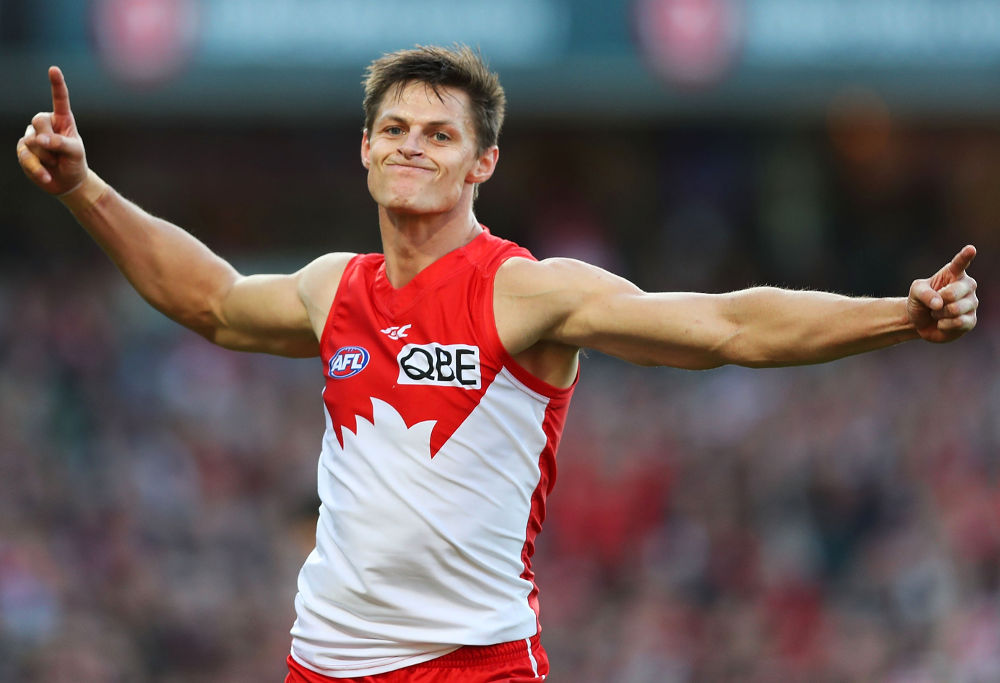'Not a happy man': Longmire incredulous as Sun awarded controversial mark... and takes full toll
An angry Horse at the SCG!

After a barnstorming final-quarter win against Geelong in Round 6, the Swans, clear favourites against the Roos, shot themselves in the foot with another disappointing home-ground performance.
It’s not the first time this season the Swans have been expected to win and have made a mess of things. It continues a long, storied chapter in the club’s history of its aversion to favouritism.
Some fans wonder if the club doesn’t want to be feared, others accuse the players of not caring enough. Who knows really, but occasionally there’s a rational explanation for a given performance – when instead you want a knee-jerk Monday reaction, baby out with the bath water type of statement – that conveys your disappointment and rage.
As the players have said previously, they’re acutely aware of their own performances and the criticism they receive.
While they don’t pay particular attention to social media or news agencies – one would hope they wouldn’t in light of Travis Cloke struggling with it – inside the club’s four walls they know what they did wrong. The coaches will tell them, and they will train hard all week and come out breathing fire next game.
Ideally you don’t want to come into a big game after a loss, certainly off the back of a poor performance too, but sometimes games like that galvanise a club.
We’ve had a fair few of those in the past. Games in 2005 and 2006 forced the players to improve, and the Swans famously made Andrew Demetriou eat his own words.

(Paul Kane/Getty Images)
Over the past five years the Swans have been able to reverse poor form, going on winning streaks that even St Kilda from 2000 to 2010 would be jealous of.
There are always matches or moments in matches that seem to fire up the Swans. The loss to St Kilda in 2012, the belting handed out by the Roos at the SCG in 2014, the last-gasp loss to the Hawks in 2016 and the shocking loss to the Blues at the MCG in 2017 all triggered turnarounds.
Fans question why the Swans need a kick in the pants to get going. It is a fair question to ask for a team that has often won 80 per cent of games over two-thirds of any season in the last five years.
This year is no different, with home losses to Port Adelaide, Adelaide and North Melbourne frustrating fans. Questions are asked of the players and club, blame is assigned to underperforming players and coaches, fans demand heads must roll – just read the online forums and browse social media groups to understand the unified frustration of the supporters.
It is a bizarre feeling to have grown up as a Swans supporter, first with hope and resignation, later full of expectation and later with fury when the club fails.
Are we Swans supporters becoming the thing we hate most? Are we turning into the Collingwood of New South Wales? I would hope not. But is it another case of the players collapsing under the weight of expectation? The Swans have never enjoyed favouritism, often struggling with the expectation of victory.

(Cameron Spencer/Getty Images)
Fans no longer hope the Swans will win; they expect them to turn up and flog whoever they play by no less than 10 goals. They sure can do it, so people ask why they cannot do it week in and week out.
A lot happens behind the scenes that we are not aware of. Form is not coherent or consistent. Role changes, injuries, sleep, diet, relationships, off-field issues and even on-field issues – there are too many factors that affect whether a player performs.
Anxiety is common among footballers. Mitch Morton famously suffered from anxiety, and on one occasion it was severe enough to force him to withdraw himself from a game before the first bounce. Most players wouldn’t offer statements like that, but it makes you wonder.
I propose another reason why the Swans are inconsistent this year – a game style change. The Swans made significant changes to their coaching panel in the off-season, swapping experience for youth.
Stalwarts Henry Playfair, Stuart Dew, Stephen Taubert and Josh Francou moved on or retired, leaving just John Longmire and Brett Kirk. Rhyce Shaw was promoted from the reserves, while Alex Johnson and Dean Cox were recruited from the Giants and Eagles.

(Mark Metcalfe/AFL Media/Getty Images)
That is a lot of new blood in one year, especially given their lack of experience. Fremantle tried it a few years back and failed spectacularly, but the Swans are still competitive despite a significant injury list.
The club is still missing Lance Franklin, Dan Hannebery and Sam Reid, three of their best players, along with Sam Naismith and Kurt Tippett on the long-term injury list. Sam will not be returning until next year from a ruptured ACL, while Kurt retired after his ankle reconstruction.
It would be an easy cop-out to blame umpires and injuries, and perhaps they have played their role. Form of key players is well down from where it should be, and injuries certainly have played a part in that. Luke Parker, one of the Swans’ best contested-ball winners, has had to play full forward in the absence of Lance Franklin.
Oliver Florent and Will Hayward have pace to burn, joining the likes of Gary Rohan, Zak Jones and Tom Papley, while Ryley Stoddart and Matthew Ling are carving up the NEAFL. There is a clear move away from contested ball and clearance dominance, and even winning the tackle count.
The Swans are no longer winning those stats each week. They’re trying to implement a tempo style with a lot of control through short kicks and uncontested possessions yet moving the ball fast on the counter.
[latest_videos_strip category=”afl” name=”AFL”]
At times its worked and looked fantastic – the last quarter against Geelong, the four-quarter effort against the Giants and the tremendous win against the Eagles at Perth Stadium.
Combined with a mixed zonal defence, the Swans have proven themselves difficult to break down and score against, without exposing their undersized and slow defenders.
Jarrad McVeigh and Heath Grundy have revelled in the new game style, especially Heath against North on Saturday night, with more than 400 metres gained from 22 disposals and just one turnover. Not even the most loyal Grundy supporter would have thought that possible.
When it doesn’t work, the Swans look hopeless, static and even clueless. Bridging the gap between their best and worst is the number one priority for the players, and it’s where the leaders have to stand up and lead from the front.
The youth is serving its part and playing brilliantly, it’s time for the statesmen and leaders to lift.